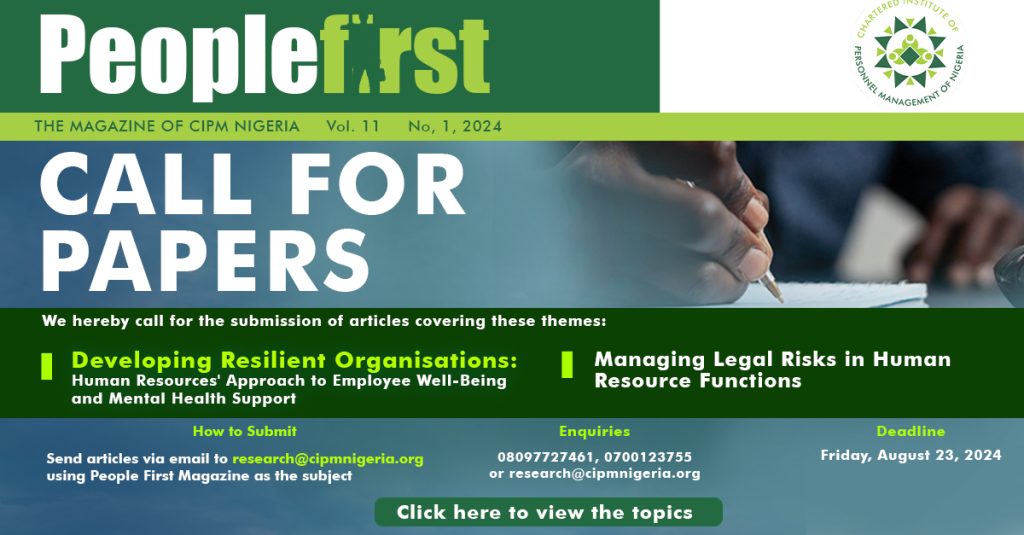CIPM invite you to contribute relevant and timely articles to People First Magazine to support the HR professionals to gain more knowledge in the practice of Human Resource Management on the following themes:
Theme 1: “Developing Resilient Organisations: Human Resources’ Approach to Employee Well-Being and Mental Health Support”.
Writers are expected to choose one of the underlisted topics. They may also expand their views beyond the guides given under each topic where relevant and applicable.
Topic 1. Building a Supportive Organisational Culture
In today’s workplace, the focus on employee well-being and mental health has become paramount. Your article should explore how organisations can create environments where these aspects are prioritised, fostering open dialogues on mental health and implementing robust support systems. Address the role of leadership in promoting well-being initiatives, including training on mental health awareness. Additionally, discuss strategies for engaging employees in developing tailored well-being programs and utilising their feedback effectively.
Topic 2. Developing Comprehensive Well-Being Programs
Your article should explore the holistic approach to employee well-being, covering physical, mental, emotional, and social dimensions. Discuss effective strategies for promoting physical health through fitness programs, nutrition, and ergonomic practices, while also addressing mental and emotional well-being through stress management, resilience training, and access to counselling services. Additionally, explore initiatives aimed at fostering social connections and community building within the workplace, including team-building activities and social events. Your contribution will provide valuable insights to HR professionals on designing and implementing well-being programs that support a healthy and engaged workforce.
Topic 3. Integrating Mental Health Support into HR Practices
Your article on this topic should explore the strategic integration of mental health initiatives within HR frameworks, encompassing the development and implementation of comprehensive mental health policies and procedures that ensure confidentiality and support for employees. Additionally, discuss the role and benefits of Employee Assistance Programs (EAPs) in promoting mental well-being among staff, along with strategies to enhance EAP utilization. Finally, examine the impact of mental health awareness training for employees and managers, emphasizing initiatives to reduce stigma and foster a supportive workplace culture. Your insights should provide HR professionals with practical guidance on effectively integrating mental health support into organisational practices.
Topic 4. Measuring and Evaluating Well-Being Initiatives
The write up should focus on defining KPIs specific to well-being and mental health programs, methodologies for assessing program impact, strategies for data analysis using surveys and feedback loops, and effective communication of findings to stakeholders. Contributions should offer in-depth insights into these areas, advancing the discourse on evaluating the effectiveness and organizational benefits of well-being initiatives.
Topic 5. Addressing Specific Well-Being Challenges
The writeup should encompass focused discussions on managing workplace stress and burnout, supporting remote and hybrid workers, and coping with organizational change and uncertainty. Manuscripts should explore the identification of stressors, implementation of preventative strategies, and support mechanisms tailored to remote work environments. Additionally, contributions should address resilience-building tactics to navigate organizational transitions effectively. This call invites comprehensive insights and practical approaches to enhance employee well-being in evolving workplace dynamics.
Topic 6. Best Practices in Employee Well-Being and Mental Health Support
The write up should explore “Successful Well-Being Programs” and “Innovative Approaches to Mental Health Support.” Submissions should encompass a broad range of points including the components of effective well-being programs, strategies for fostering supportive workplace cultures, and metrics for evaluating program success. Additionally, we are interested in innovative mental health support programs, showcasing new trends and technologies such as digital mental health platforms, teletherapy, and AI-driven tools. The paper should provide detailed examples, case studies, and forward-looking insights to guide organizations in developing impactful well-being and mental health initiatives.
Topic 7. Action Planning and Implementation
The write up should provide comprehensive coverage on developing well-being strategies, including the steps to create these strategies and how to align them with organizational goals. Additionally, we are interested in practical insights on implementing and managing well-being and mental health programs, ensuring their effective rollout and ongoing support. Finally, we welcome submissions on continuous improvement and adaptation, focusing on the regular review, updating, and responsiveness to changing needs and feedback. Author should provide detailed examples, case studies, and best practices to guide organizations in planning, implementing, and evolving their well-being initiatives.
Theme 2: Managing Legal Risks in Human Resource Functions
Topic 1: Recruitment and Selection:
The write-up should explore the legal considerations in job advertisements, ensuring compliance with regulations to avoid misleading or discriminatory content. It should also address discussions on fair employment practices and discriminatory laws, providing insights into how organizations can uphold these principles throughout the recruitment process. Additionally, submission should address the legal aspects of conducting background checks, balancing thorough vetting with respect for privacy concerns. Authors should offer detailed analysis, case studies, and practical guidelines to help HR professionals navigate the complex legal landscape of recruitment and selection.
Topic 2. Employment Contracts and Agreements:
We seek papers that explore the essential elements of a legally binding employment contract, detailing the key components and best practices for ensuring enforceability. Additionally, we are interested in discussions on non-disclosure agreements (NDAs) and confidentiality clauses, emphasizing their significance and practical implementation. Submissions should also cover compliance with local labour laws and regulations, providing guidance on aligning employment agreements with legal requirements. Authors should provide thorough analysis, case studies, and practical insights to help organizations effectively draft and manage employment contracts within the legal framework.
Topic 3. Workplace Health and Safety:
We seek papers that provide comprehensive coverage of Occupational Safety and Health Administration (OSHA) regulations, outlining key requirements and compliance strategies. Additionally, we are interested in discussions on employee rights in ensuring a safe workplace, highlighting both employer responsibilities and employee protections. Submissions should also address handling workplace accidents and legal liabilities, offering practical advice on risk management and legal considerations. Authors should provide detailed analysis, case studies, and practical insights to help organizations maintain a safe and legally compliant work environment.
Topic 4. Disciplinary Actions and Termination:
We seek papers that explore due process in disciplinary actions, detailing fair procedures and employee rights throughout the process. Additionally, we are interested in discussions on the legal considerations involved in terminating employees, covering grounds for termination, documentation requirements, and potential liabilities. Submissions should also address severance packages and release agreements, providing insights into best practices for structuring these agreements and ensuring legal compliance. Authors should offer thorough analysis, case studies, and practical guidelines to help organizations navigate disciplinary actions and terminations effectively within the bounds of the law.
Topic 5. Employee Privacy and Data Protection:
We seek papers that explore the implications of GDPR and other data protection laws on employee privacy, detailing compliance requirements and best practices for safeguarding sensitive information. Additionally, we are interested in discussions on the monitoring of employee communications and associated privacy concerns, addressing legal considerations and ethical implications. Submissions should also cover strategies for handling employee data breaches, offering insights into incident response protocols and mitigation measures. Authors are encouraged to provide in-depth analysis, case studies, and practical guidance to help organizations navigate the complex landscape of employee privacy and data protection effectively.
Topic 6. Workplace Diversity and Inclusion:
We seek papers that examine the legal frameworks supporting diversity and inclusion initiatives, exploring regulatory requirements and best practices for fostering a diverse workforce. Additionally, we are interested in discussions on addressing discrimination and harassment complaints in the workplace, emphasizing legal considerations and effective resolution strategies. Submissions should also cover affirmative action programs, providing insights into their implementation, impact, and legal implications. Authors are encouraged to offer comprehensive analysis, case studies, and practical recommendations to help organizations promote diversity, inclusion, and equity in the workplace while ensuring compliance with relevant laws and regulations.
Topic 7. Employee Relations and Dispute Resolution:
We seek papers that explore effective strategies for handling employee grievances and disputes in the workplace, emphasizing fair practices and conflict resolution techniques. Additionally, we are interested in discussions on mediation and arbitration processes, detailing their roles in resolving conflicts and fostering positive employee relations. Submissions should also address the legal considerations involved in implementing employee relations strategies, ensuring compliance with labour laws and regulations. Authors are encouraged to provide comprehensive analysis, case studies, and practical insights to help organizations manage employee disputes effectively and maintain productive workplace relationships.
Topic 8. HR Policies and Documentation:
We seek papers that focus on creating compliant HR policies and procedures, outlining best practices for drafting, implementing, and communicating policies effectively. Additionally, we are interested in discussions on document retention policies and legal requirements, emphasizing strategies for managing and preserving HR documentation in accordance with regulatory standards. Submissions should also cover the importance of regularly reviewing and updating policies to ensure ongoing legal compliance and alignment with organizational goals. Authors are encouraged to provide thorough analysis, case studies, and practical guidance to assist HR professionals in developing robust policies and maintaining accurate documentation practices.
“All interested authors are advised to visit the website for more details about the topics covered under Theme 1 and Theme 2.
Send article to research@cipmnigeria.org using People First Magazine as the Email Subject.
Articles should not exceed 1500 words with font size 12 Times New Romans.
Deadline for Submission is August 23rd, 2024.
NOTE: “Only qualitative articles that align with the theme shall be selected for publication. Selection shall be done on first come first served basis”.




